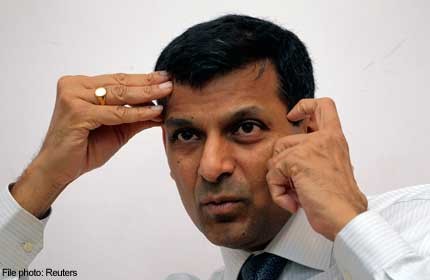India's new central bank chief warns of unpopular steps to fight crisis

MUMBAI - Top economist Raghuram Rajan warned Wednesday that he may have to take unpopular steps to tackle India's worst economic crisis in decades as he took over as the central bank's new chief.
Rajan, a former IMF chief economist, sought to reassure rattled markets, saying India faced tough challenges but was fundamentally sound, as policymakers battle a plummeting rupee and decade-low growth.
But in his first public comments after taking over as Reserve Bank of India (RBI) governor earlier Wednesday, Rajan added that "some of the actions I take will not be popular", without detailing them.
"The governorship of the central bank is not meant to win one votes or Facebook 'likes'. But I hope to do the right thing, no matter what the criticism, even while looking to learn from the criticism," he said in a televised statement.
Rajan, famed for forecasting the 2008 global financial crisis, takes over from incumbent Duvvuri Subbarao, as India's once-booming economy is caught in a quagmire of sharply slowing growth, high inflation, a record current account deficit and sliding currency.
Some analysts fear Asia's third-largest economy could be heading for a meltdown with the rupee down around 17 per cent against the dollar this year.
Rajan stressed that he would hew to the RBI's mandate of "securing monetary stability" and sustaining confidence in the value of the country's money, which means "low and stable inflation".
He added that the RBI needed to be a "beacon of responsibility" and that protecting the value of money against corrosion of inflation was crucial.
Subbarao said earlier Wednesday that his successor was in for a bumpy ride with an economy that grew at a decade low of five per cent in the last financial year - way below the near double-digit levels notched up during the heady noughties.
"The country could not have asked for a more capable person to lead the RBI in these most difficult times," he added.
Rajan will take charge operationally on Thursday at the bank's headquarters in financial hub Mumbai.
Investors are looking to Rajan to introduce policies to calm jittery markets and stabilise the rupee.
"It would be unfair to expect magic from one person," said Siddhartha Sanyal, chief India economist with Barclays Capital.
"But he is well-equipped to deliver the best one can, given his credentials."
Abheek Barua, chief economist with HDFC Bank, called Rajan "more innovative" than Subbarao, who spent five years at the helm of the RBI, and said that he expected him to "be more aggressive".
The RBI has introduced a series of recent measures to try to halt the rupee's slide, raising short-term interest rates and tightening cash in the system.
The currency ended the day slightly firmer at 67.08 rupees to the dollar, helped by suspected heavy intervention by the central bank, dealers said.
Shares closed up nearly two per cent at 18,567 on bargain-hunting by investors after analysts said the market was oversold.
The currency has been forecast by Goldman Sachs to fall to 72 to the dollar in coming months.
A depreciating rupee makes imports of everything from oil to coal and chemicals costlier, and comes as foreign capital inflows into India are drying up and the government is trying to plug the gaping current account deficit.
Analysts have raised fears India could face a crunch of the sort it suffered in 1991, when a foreign exchange-strapped government had to pawn its gold for an International Monetary Fund (IMF) bailout.
India's economy grew by 4.4 per cent in the first three months of the fiscal year, the slowest quarterly expansion since 2009.
Adding to gloom, a World Economic Forum report said India slipped to 60th position out of 148 nations in terms of global competitiveness, its lowest ever rank.
The government is desperate to kickstart growth before elections due by May. The RBI has come under pressure to cut rates to try to boost economic growth but such a move could fuel already high inflation.
Rajan left his post as a professor at the University of Chicago's Booth School of Business and returned to India last year to become an adviser to Prime Minister Manmohan Singh.